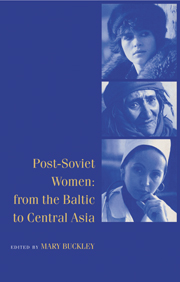Book contents
- Frontmatter
- Contents
- List of figures
- List of tables
- Notes on contributors
- Note on transliteration
- Map
- INTRODUCTION
- PART I WOMEN IN THE RUSSIAN FEDERATION
- 2 Do Russian women want to work?
- 3 Rural women and the impact of economic change
- 4 Women and the culture of entrepreneurship
- 5 Images of an ideal woman: perceptions of Russian womanhood through the media, education and women's own eyes
- 6 ‘She was asking for it’: rape and domestic violence against women
- 7 ‘For the sake of the children’: gender and migration in the former Soviet Union
- 8 When the fighting is over: the soldiers' mothers and the Afghan madonnas
- 9 Adaptation of the Soviet Women's Committee: deputies' voices from ‘Women of Russia’
- 10 Women's groups in Russia
- PART II WOMEN OUTSIDE RUSSIA IN NEWLY INDEPENDENT STATES
- Index
8 - When the fighting is over: the soldiers' mothers and the Afghan madonnas
Published online by Cambridge University Press: 18 December 2009
- Frontmatter
- Contents
- List of figures
- List of tables
- Notes on contributors
- Note on transliteration
- Map
- INTRODUCTION
- PART I WOMEN IN THE RUSSIAN FEDERATION
- 2 Do Russian women want to work?
- 3 Rural women and the impact of economic change
- 4 Women and the culture of entrepreneurship
- 5 Images of an ideal woman: perceptions of Russian womanhood through the media, education and women's own eyes
- 6 ‘She was asking for it’: rape and domestic violence against women
- 7 ‘For the sake of the children’: gender and migration in the former Soviet Union
- 8 When the fighting is over: the soldiers' mothers and the Afghan madonnas
- 9 Adaptation of the Soviet Women's Committee: deputies' voices from ‘Women of Russia’
- 10 Women's groups in Russia
- PART II WOMEN OUTSIDE RUSSIA IN NEWLY INDEPENDENT STATES
- Index
Summary
With the war in Chechnia on Russian television news, Afghanistan cannot but be on the minds of its audience. Notwithstanding the comparisons being drawn between Moscow's strategy behind its military incursions of 1979 and 1994, the Afghanistan war continues to be of significance for post-Soviet society. It is not just that those who were directly affected by it – the servicemen, their fathers, mothers, wives and children, plus the women who served there, too – who cannot escape from its consequences. The legacy of the war is important for the whole society.
Afghanistan is associated in their minds and ours with the collapse of the Soviet Union. While military defeat in this proxy war with the United States meant that the Soviet Union had lost the Cold War, it is also synonymous with the breakdown of the domestic fabric of Soviet power. That is to say, Afghanistan is not significant because the reputation of the Soviet armed forces was discredited on its soil, but because the policies and politics of dealing with the war inside the USSR were. Mismanagement of the episode led the citizens to question the foundations on which the CPSU had placed their Motherland. Its authority was undermined in the late 1980s when the extent of its lies and misrepresentation on everything to do with the war (the battles, the human and financial cost, the fate of the returning servicemen and women) became clear.
- Type
- Chapter
- Information
- Post-Soviet WomenFrom the Baltic to Central Asia, pp. 141 - 156Publisher: Cambridge University PressPrint publication year: 1997
- 1
- Cited by



